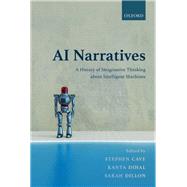AI Narratives A History of Imaginative Thinking about Intelligent Machines
, by Cave, Stephen; Dihal, Kanta; Dillon, Sarah- ISBN: 9780198846666 | 0198846665
- Cover: Hardcover
- Copyright: 5/5/2020
Stephen Cave, Executive Director, Leverhulme Centre for the Future of Intelligence, University of Cambridge,Kanta Dihal, Research Associate, Leverhulme Centre for the Future of Intelligence, University of Cambridge,Sarah Dillon, Lecturer in Literature and Film, Faculty of English, University of Cambridge
Stephen Cave
Dr Stephen Cave is Executive Director of the Leverhulme Centre for the Future of Intelligence, Senior Research Associate in the Faculty of Philosophy, and Fellow of Hughes Hall, all at the University of Cambridge. After earning a PhD in philosophy from Cambridge, he joined the British Foreign Office, where he spent ten years as a policy advisor and diplomat, before returning to academia. His research interests currently focus on the nature, portrayal and governance of AI.
Kanta Dihal
Dr Kanta Dihal is a postdoctoral researcher at the Leverhulme Centre for the Future of Intelligence, University of Cambridge. She is the Principal Investigator on the Global AI Narratives project, and the Project Development Lead on Decolonizing AI. In her research, she explores how fictional and nonfictional stories shape the development and public understanding of artificial intelligence. Kanta's work intersects the fields of science communication, literature and science, and science fiction. She is currently working on two monographs: Stories in Superposition, based on her DPhil thesis, and AI: A Mythology, with Stephen Cave.
Sarah Dillon
Dr Sarah Dillon is University Lecturer in Literature and Film in the Faculty of English, University of Cambridge. Her books include The Palimpsest: Literature, Criticism, Theory (2007), Deconstruction, Feminism, Film (2018), and Listen: Narrative Evidence and Public Reasoning (2020, co-authored with Claire Craig). She is the General Editor of the series Gylphi Contemporary Writers: Critical Essays, and editor of two volumes in the series: David Mitchell: Critical Essays (2011), and Maggie Gee: Critical Essays (2015, co-ed). Dr Dillon was a 2013 BBC Radio 3/Arts and Humanities Research Council New Generation Thinker and regularly broadcasts on BBC Radio 3 and BBC Radio 4.
Introduction
Imagining AI, Stephen Cave, Kanta Dihal and Sarah Dillon
PART I - ANTIQUITY TO MODERNITY
1. Homer's Intelligent Machines: AI in Antiquity, Genevieve Liveley and Sam Thomas
2. Demons and Devices: Artificial and Augmented Intelligence before AI, E. R. Truitt
3. The Android of Albertus Magnus: A Legend of Artificial Being, Minsoo Kang and Ben Halliburton
4. Artificial Slaves in the Renaissance and the Dangers of Independent Innovation, Kevin LaGrandeur
5. Making the Machine Speak: Hearing Artificial Voices in the Eighteenth Century, Julie Park
6. Victorian Fictions of Computational Creativity, Megan Ward
7. Machines Like Us? Modernism and the Question of the Robot, Paul March-Russell
PART II - MODERN AND CONTEMPORARY
8. Enslaved Minds: Artificial Intelligence, Slavery, and Revolt, Kanta Dihal
9. Machine Visions: Artificial Intelligence, Society, and Control, Will Slocombe
10. "A push-button type of thinking": Automation, Cybernetics, and AI in Mid-century British Literature, Graham Matthews
11. Artificial Intelligence and the Parent/Child Narrative, Beth Singler
12. AI and Cyberpunk Networks, Anna McFarlane
13. AI: Artificial Immortality and Narratives of Mind-Uploading, Stephen Cave
14. Artificial Intelligence and the Sovereign-Governance Game, Sarah Dillon and Michael Dillon
15. The Measure of a Woman: Fembots, Fact and Fiction, Kate Devlin and Olivia Belton
16. The Fall and Rise of AI: Investigating AI Narratives with Computational Methods, Gabriel Recchia
The New copy of this book will include any supplemental materials advertised. Please check the title of the book to determine if it should include any access cards, study guides, lab manuals, CDs, etc.
The Used, Rental and eBook copies of this book are not guaranteed to include any supplemental materials. Typically, only the book itself is included. This is true even if the title states it includes any access cards, study guides, lab manuals, CDs, etc.
Digital License
You are licensing a digital product for a set duration. Durations are set forth in the product description, with "Lifetime" typically meaning five (5) years of online access and permanent download to a supported device. All licenses are non-transferable.
More details can be found here.






